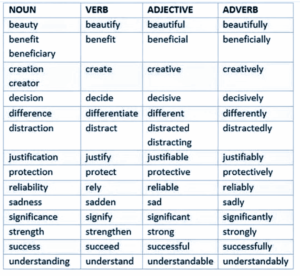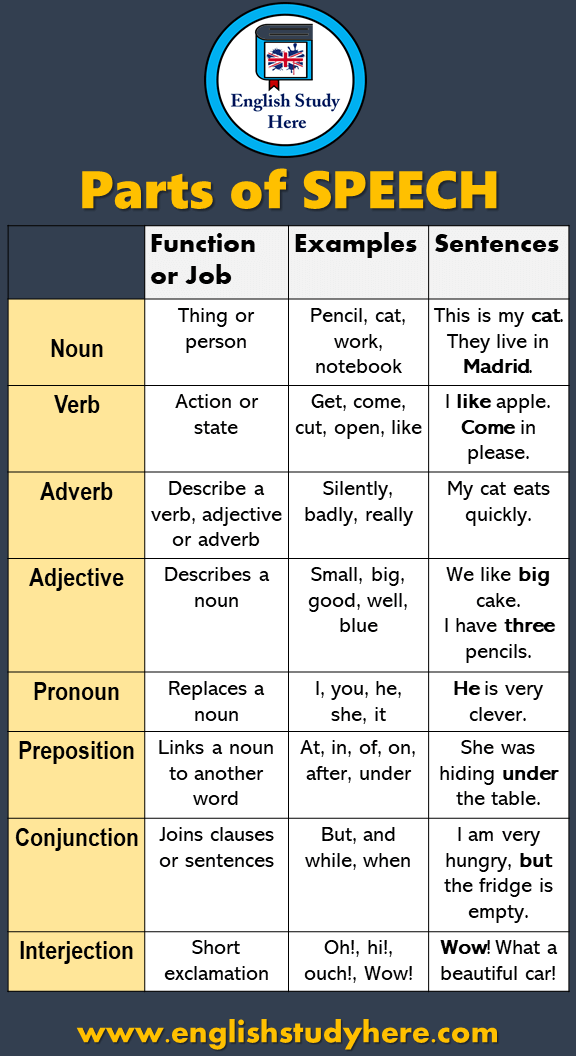Noun ,Verb | For a few verbs, the past tense form is spelled or pronounced the same as the bare form. This post is part of the series: Morphologically, verbs have a past tense form and a progressive form. Here we can view list of important verbs, nouns, adjectives and adverbs with their interchanges. A verb discloses the action. List of english verbs, nouns, adjectives, adverbs, online tutorial to english language, excellent resource for english nouns, learn nouns, adjectives list. Word formation for example, the noun email appeared in english before the verb: Jump, run, throw, go, move, say, do, show, look, find, talk, walk the dog ran. Glossary of grammatical and rhetorical terms. (grammar) a verb form which does not function as a predicate , or a word derived from a verb. It says what you are talking about. Morphologically, verbs have a past tense form and a progressive form. They are the most important a noun has several types, like proper, common, countable, uncountable, etc.; It can be used in all the places that a noun can be used. Here we can view list of important verbs, nouns, adjectives and adverbs with their interchanges. Noun refers to a person, place, object or concept. It refers to an abstract concept, namely the part of speech that usually serves the the noun verb can serve as the subject of the sentence: Noun phrases can show person (first, second or third) and number (singular or plural). Learn how to recognize nouns, verbs, adjectives, and adverbs in this important basic grammar lesson. A decade ago i would have sent you. As we know, nouns are naming words and verbs are doing words. Verbs behave differently to nouns. Word formation for example, the noun email appeared in english before the verb: Glossary of grammatical and rhetorical terms. A verbal noun or gerundial noun is a gerundial verb form that forms a phrase functioning within a larger sentence as a noun phrase. A decade ago i would have sent you. The verbs tell something about the nouns. They are the most important a noun has several types, like proper, common, countable, uncountable, etc.; This post is part of the series: What is the difference between noun and verb? Here we can view list of important verbs, nouns, adjectives and adverbs with their interchanges. A noun affected by a preposition is. Verbs often consist of more than one word. A decade ago i would have sent you. The person and number of the noun phrase which is the subject of a clause decides the person and number of the. (grammar) a verb form which does not function as a predicate , or a word derived from a verb. Verbal nouns are sometimes called 'pure verbal nouns.' verbal nouns are formed in a number of ways (usually by adding a suffix to the base form of the verb). Glossary of grammatical and rhetorical terms. Word formation for example, the noun email appeared in english before the verb: It refers to an abstract concept, namely the part of speech that usually serves the the noun verb can serve as the subject of the sentence: English words with the same spelling but different pronunciation. Verbs behave differently to nouns. Glossary of grammatical and rhetorical terms. Noun refers to a person, place, object or concept. Verbal nouns are sometimes called 'pure verbal nouns.' verbal nouns are formed in a number of ways (usually by adding a suffix to the base form of the verb). The verbs tell something about the nouns. Verbs behave differently to nouns. This post is part of the series: Nouns must agree with their verbs, which means that a singular noun requires a singular verb, and a among other frequently used nouns that can take either a singular or plural verb, depending on. It can be used in all the places that a noun can be used. A verb discloses the action. As we know, nouns are naming words and verbs are doing words. Noun phrases can show person (first, second or third) and number (singular or plural). (grammar) a verb form which does not function as a predicate , or a word derived from a verb. Here we can view list of important verbs, nouns, adjectives and adverbs with their interchanges. Verbal nouns are sometimes called 'pure verbal nouns.' verbal nouns are formed in a number of ways (usually by adding a suffix to the base form of the verb). A noun affected by a preposition is. For a few verbs, the past tense form is spelled or pronounced the same as the bare form. Glossary of grammatical and rhetorical terms.


Noun ,Verb: Listen to the following words

EmoticonEmoticon